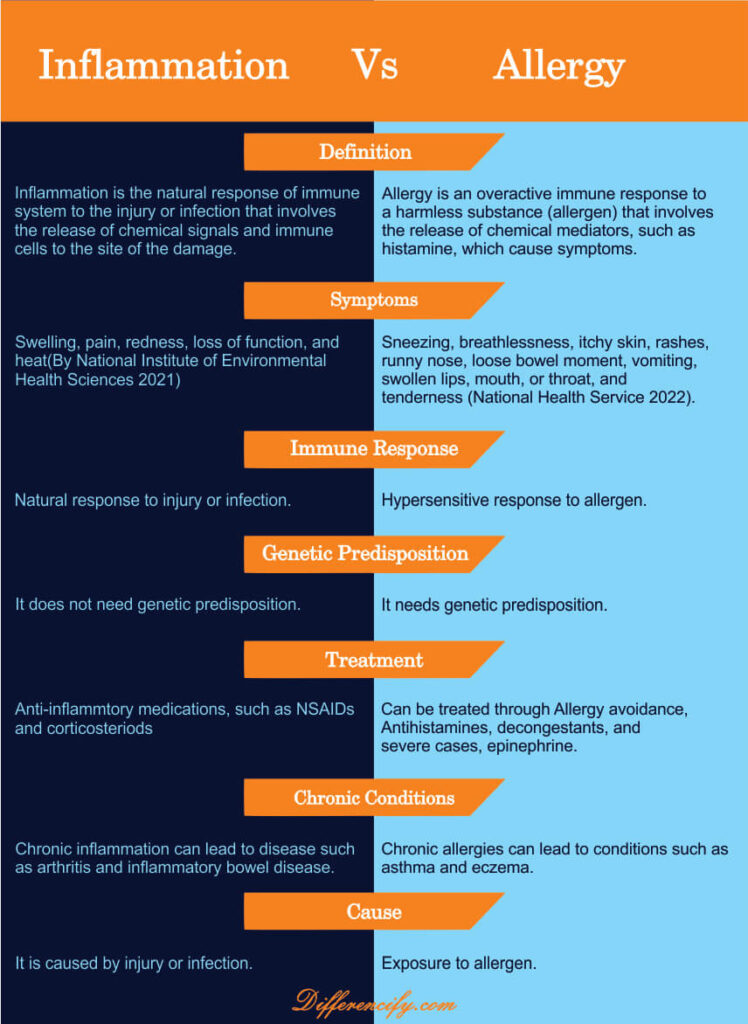Inflammation and allergy are two common health conditions that can affect the body in various ways. While both inflammation and allergy involve the immune system, they differ in their causes, symptoms, and treatment. Understanding the difference between inflammation and allergy is essential for the proper diagnosis and treatment of these conditions. So in this article, we will have a look at the complete difference between these two terms with the help of a table and different key concepts.
Inflammation Vs Allergy (Comparison Table)
| Inflammation | Allergy |
|---|---|
| Inflammation is a natural response of the immune system to injury or infection that involves the release of chemical signals and immune cells to the site of damage. | Allergy is an overactive immune response to a harmless substance (allergen) that involves the release of chemical mediators, such as histamine, which cause symptoms. |
| Its symptoms include redness, loss of function swelling, heat, pain, and fever (National Institute of Environmental Health Science 2021) | Its symptoms include sneezing, runny nose, itchy or watery eyes, vomiting, swollen lips, mouth, or throat, skin rash, hives, and anaphylaxis |
| Inflammation is the natural response to injury or infection. | Allergy is the hypersensitive response to the allergen. |
| It does need genetic predisposition. | It needs genetic predisposition. |
| Inflammation can be treated through Anti-inflammatory medications, such as NSAIDs and corticosteroids. | It can be treated through allergy avoidance, Antihistamines, decongestants, and severe cases, and epinephrine. |
| Chronic inflammation can lead to diseases such as arthritis and inflammatory bowel disease | Chronic allergies can lead to conditions such as asthma and eczema |
| It is caused by injury or infection | It is caused by exposure to the allergen |
What is inflammation?
Inflammation is a natural response of the body’s immune system to injury or infection. When the immune system detects an injury or infection, it triggers a cascade of events that lead to the release of chemical signals, such as cytokines and chemokines, which attract immune cells to the site of injury or infection. The immune cells, including white blood cells, then work to eliminate the injury or infection and repair the damaged tissue.
Inflammation can be acute or chronic. Acute inflammation is a short-term response that occurs in response to injury or infection, while chronic inflammation is a long-term response that can last for weeks, months, or even years. Chronic inflammation is associated with various chronic diseases, such as arthritis, asthma, and inflammatory bowel disease.
What is an allergy?
Allergy is a hypersensitive immune response to a foreign substance that is typically harmless to most people. The foreign substance, known as an allergen, triggers an immune response that leads to the release of histamine and other chemical mediators, which cause the symptoms of allergy.
Allergens can be inhaled, ingested, or come into contact with the skin. Common allergens include pollen, dust mites, animal dander, foods, and certain medications. Allergy symptoms can range from mild to severe and may include sneezing, runny nose, itchy eyes, hives, and anaphylaxis, a life-threatening allergic reaction.
Key Differences Between Inflammation and Allergy
- Cause: Inflammation is caused by injury or infection, while allergy is caused by exposure to an allergen.
- Immune Response: Inflammation is a natural response of the immune system to injury or infection. On the other hand, allergy is a hypersensitive immune response to a harmless substance.
- Symptoms: Inflammation typically causes redness, swelling, and pain at the site of injury or infection. On the other hand, allergy symptoms can include a runny nose, sneezing, hives, and anaphylaxis.
- Timing: Inflammation is a rapid response that occurs within minutes to hours of injury or infection, while allergy symptoms may take longer to develop and can persist for days.
- Treatment: Inflammation is typically treated with anti-inflammatory medications, such as nonsteroidal anti-inflammatory drugs (NSAIDs) and corticosteroids. Allergy, on the other hand, is treated with antihistamines, decongestants, and in severe cases, epinephrine.
The following table also compares both inflammation vs allergy in a sequential manner.

Similarities Between Inflammation and Allergy
Besides differences, there are also some similarities between inflammation and allergy. They are as follows.
- Immune System Involvement: Both inflammation and allergy involve the immune system. Inflammation is a natural response of the immune system to injury or infection. On the other hand, allergy is an overactive immune response to a harmless substance. In both cases, immune cells release chemical mediators that lead to the symptoms of the condition.
- Symptoms Overlap: The symptoms of inflammation and allergy can overlap, especially when it comes to inflammation caused by allergies. For example, both conditions can cause redness, swelling, and pain. Additionally, allergies can cause inflammation in various parts of the body, such as the skin, respiratory tract, and digestive system.
- Chronic Conditions: Both inflammation and allergy can become chronic conditions. Chronic inflammation is associated with various chronic diseases, such as arthritis and inflammatory bowel disease, while chronic allergies can lead to conditions such as asthma and eczema. In both cases, proper treatment is essential to manage the symptoms and prevent further damage to the body.
Conclusion
So to sum up this article, we can say that inflammation and allergy are two common health conditions that involve the immune system but differ in their causes, symptoms, and treatment. Inflammation is a natural response of the immune system to injury or infection. On the other hand, allergy is a hypersensitive immune response to a harmless substance.
Inflammation typically causes redness, swelling, and pain at the site of injury or infection, while allergy symptoms can include a runny nose, sneezing, hives, and anaphylaxis. Treatment for inflammation typically involves anti-inflammatory medications. On the other hand, treatment for allergies involves antihistamines, decongestants, and in severe cases, epinephrine. By understanding the similarities and differences between inflammation and allergy, healthcare providers can properly diagnose and treat these conditions to improve patient outcomes.
You Can Also Learn:




One Comment